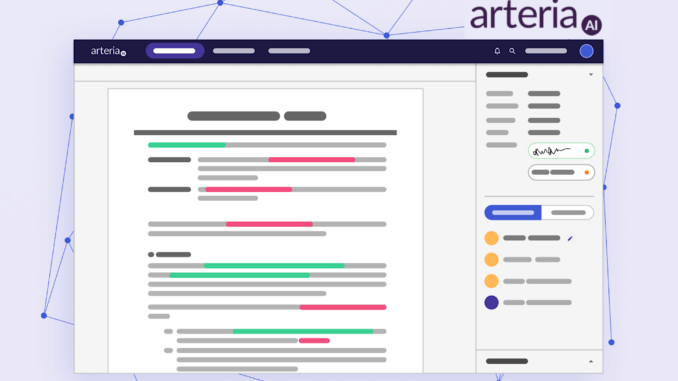
Arteria AI, a contracting system that was spun out of Big Four firm Deloitte, has received $11m in an oversubscribed Series A venture funding round just five months after going independent.
The round was led by Illuminate Financial, and Information Venture Partners, which specialises in enterprise SaaS solutions. Meanwhile Illuminate has strong relationships within the financial services sector and Arteria is their first investment after securing backing from JP Morgan and Barclays for their new fund.
Arteria co-founder, Abrar Huq, told Artificial Lawyer: ‘We see this as yet another validation for the exploding digital contracting market and, in particular, the demand for data-oriented contracting solutions.
‘We will be using this investment to grow our global team, including offices and entities in London and New York, where we already serve top tier financial institution clients. We’ve strategically chosen to align with VC firms with strong relationships in financial services.’
Huq added that they had recently hired former Director of AI Research at Thomson Reuters and Scribd, Amir Hajian, as their VP, Data Science.
They have also hired former Salesforce sales leader, Brent Taylor, as Head of Sales, and they have hired another Deloitte alum, John Wallace, as their Head of Professional Services. In short, quite a team. No surprise then that VCs were interested.
All well and good, but what does this all mean?
First, although Arteria was ‘incubated’ inside Deloitte in Canada, which clearly has helped to provide them with market credibility, to hit $11m in a Series A funding so soon after spinning out is noteworthy.
This and other recent funding rounds shows an uneven market for VC money, with some legal tech companies getting significant backing very early on, with others struggling to even survive. Perhaps this just shows VCs are doing more homework about market opportunities in the legal tech field and are being more judicious in where they invest?
Which leads us to CLM and contracting systems. As noted before by this site, CLM is seeing a boom time at the moment. That said, Arteria doesn’t explicitly sell itself as a CLM. But when you see what it does, it certainly covers off a lot of what CLMs do – and all with a strong dose of NLP to help it along.
This is what you can do with it:
- ‘Draft – Your data and inputs are used to create first drafts automatically from potentially hundreds of templates and thousands of variations.
- Negotiate – Being data-first means you can negotiate with confidence. Your playbooks and previously negotiated terms are built into Arteria to allow for maximum efficiency and effectiveness.
- Workflow – Whether it is one approval or one hundred, Arteria Flow gives you insight into where your documents are, in real time. Arteria Flow allows approvers to work through approvals quickly and clearly.
- Analyse – Spot bottlenecks and resolve them immediately with Arteria Analyze. Understand which clauses are negotiated or escalated frequently so you can speed up the contracting process.
- Extract – Legacy contracts and third party papers still contain valuable information. Using AI you can extract this data to highlight valuable insights.’
So, doc creation, workflows, insight into your contract process, and data extraction to collate BI and obligation information from the contracts. That’s a comprehensive and enterprise level outlook. And, it’s worth noting that Arteria has a special focus on the financial services market, such as targeting major banks.
No matter how we define this, the bigger story is perhaps around the fact that tools to help clients contract better, and then stay on top of contract data contained in those contracts, are really gathering momentum.

And as to the investors, this is what Mark Whitcroft, Founding Partner at Illuminate, said: ‘Building an enterprise software company and selling solutions into financial institutions is hard. It requires you can demonstrate that your product is solving real and pressing problems.
‘Arteria has developed its product through deployment across a growing collection of large financial institutions, which is incredible for such a young company. The breadth of use cases we see for digital contracting to transform legacy processes within banks creates vast white space to innovate and take market share.’
2 Trackbacks / Pingbacks
Comments are closed.